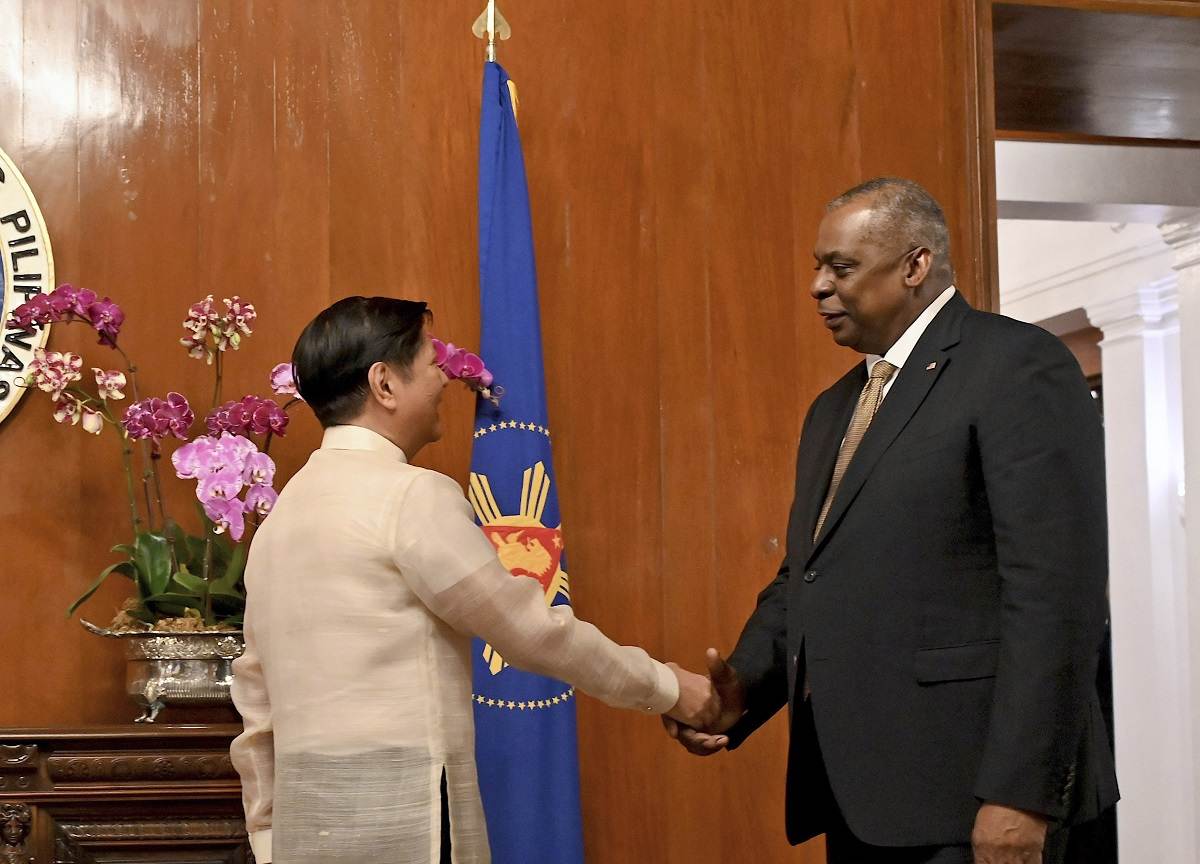
U.S. Secretary of Defense Lloyd James Austin III, right, shake hands with Philippine President Ferdinand Marcos Jr. during a courtesy call at the Malacanang Palace in Manila on Feb. 2.
2:00 JST, February 11, 2023
Japan and the Philippines have made clear that they will strengthen trilateral security cooperation between them and the United States, their common ally.
Aiming to deter China from its attempts to change the status quo by force in the East and South China Seas and prevent a contingency in Taiwan, the nations will deepen cooperation in peacetime through joint exercises and maritime surveillance activities.
Prime Minister Fumio Kishida, during a summit in Tokyo on Thursday with Philippine President Ferdinand Marcos Jr., expressed his willingness to expand bilateral cooperation in the security and economic fields.
“To maintain and strengthen the free and open international order, we place a heavy emphasis on cooperation with your country, a maritime state,” Kishida said.
Marcos replied that the friendship between Tokyo and Manila was the strongest, most powerful and most reliable in the region, while showing expectations for Japan’s increased involvement.
They also reaffirmed the importance of strengthening maritime surveillance activities, as noted in their joint statement: “The leaders of two maritime states, sharing critical interest in keeping the waters of the Indo-Pacific safe and free, reaffirmed the importance of efforts to reinforce … maritime law enforcement based on international law.”
Including the United States, the three nations share concerns over a possible contingency in Taiwan as well as the importance of maintaining the status quo in the East and South China Seas. Since Taiwan is located between Japan and the Philippines, the two countries will be significantly affected if a contingency occurs.
When U.S. forces participate in a Taiwan contingency, the Philippines could become a strategic point for U.S. operations and is expected to be a destination for evacuees from Taiwan, including Japanese nationals living there.
Japan has been providing the Philippine Coast Guard with patrol ships and other support to help increase its capabilities. The provision of surveillance and monitoring drones could be an option for the future.
“If the Philippines increases surveillance and monitoring capabilities, it will help the deterrence against China,” said a senior Self-Defense Forces official.
The U.S.-Philippine alliance has also been strengthened. At a defense ministerial meeting between the United States and the Philippines on Feb. 2, the two countries agreed to allow U.S. forces to have access to four more military bases in the Philippines, up from the current five.
The U.S. administration has hailed Japan’s support for the Philippines. When U.S. Vice President Kamala Harris visited the Philippines in November, she boarded a patrol ship provided by Japan. She brought up that fact while having a breakfast meeting with Kishida in Washington in January, saying that the event had indicated good cooperation between Tokyo and Manila.
On Thursday, Japan and the Philippines also agreed on a comprehensive deal for smooth implementation of exercises between the SDF and the Philippine military for humanitarian assistance and disaster relief.
Based on the agreement, Japan, the United States and the Philippines will expand joint exercises.
With an eye on signing a reciprocal access agreement applicable to joint exercises for overall defense, the nations aim to increase the presence of Japan and the United States in the Philippines.
Balance between U.S., China
The administration of Philippine President Ferdinand Marcos Jr., which was launched in June 2022, has been strengthening cooperation with the United States, shifting from the pro-China security policy of the administration of former President Rodrigo Duterte.
At the same, the Marcos administration employs “balanced diplomacy” to promote economic cooperation with China, aiming to gain practical benefits from both the United States and China.
The Philippines promotes security cooperation with the United States because China has not ceased its provocative actions in the South China Sea. In January, a China Coast Guard ship drove away a Philippine fishing boat operating in part of the Philippines’ exclusive economic zone. In December another China Coast Guard vessel followed a Philippine supply ship.
However, the most urgent issue facing the Philippines is achieving economic recovery from the coronavirus pandemic. Keenly aware of this situation, China tries to maintain ties with the Marcos administration by providing economic assistance — but without compromising on territorial issues in the South China Sea.
When Marcos visited China in January, the Chinese companies made investment pledges of $22.8 billion (about ¥3 trillion).
On Feb. 6, China resumed overseas group tours for Chinese citizens to certain countries including the Philippines, indicating its intention to support the early recovery of the Philippine tourism industry.
Top Articles in World
-

Israeli Ambassador to Japan Speaks about Japan’s Role in the Reconstruction of Gaza
-

Videos Plagiarized, Reposted with False Subtitles Claiming ‘Ryukyu Belongs to China’; Anti-China False Information Also Posted in Japan
-

Nepal Bus Crash Kills 19 People, Injures 25 Including One Japanese National
-

Ukrainian Ambassador Closely Watching Japan’s Revision of Defense Export Rules, Hopes for Future Arms Support
-

China, India Tapping into Promising African Market; Beijing Announces Tariff Cuts, Both Countries Aim to Expand Exports
JN ACCESS RANKING
-

Producer Behind Pop Group XG Arrested for Cocaine Possession
-

Japan PM Takaichi’s Cabinet Resigns en Masse
-

Man Infected with Measles Reportedly Dined at Restaurant in Tokyo Station
-

Israeli Ambassador to Japan Speaks about Japan’s Role in the Reconstruction of Gaza
-

Videos Plagiarized, Reposted with False Subtitles Claiming ‘Ryukyu Belongs to China’; Anti-China False Information Also Posted in Japan

























